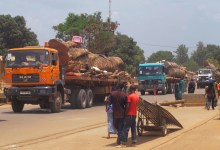
Typical street scene in Santa Ana, El Salvador. (Photo: iStock)
IMF Survey : Infrastructure Plan Leads Cameroon’s Drive for Growth
July 17, 2014
- Public investment and domestic demand keep the growth rate steady.
- Fuel subsidies crowd out more pro-poor spending in national budget.
- Closing the infrastructure gap and improving the business environment are essential to achieve development objectives.
Cameroon is set for steady economic growth this year, driven by an ambitious public investment program expected to expand electricity supply and transport infrastructure. But, the IMF said in its regular review of the Central African nation’s economy, recurrent budget deficits left a fragile fiscal situation, and oil revenue could dip due to rising production costs.

Lumber truck convoy in eastern Cameroon, where infrastructure indicators—especially for roads—are low by regional standards (photo: Reinnier Kaze/AFP/Getty/Newscom)
ECONOMIC HEALTH CHECK
An IMF staff report on Cameroon’s economy projected 2014 growth at 5.5 percent, unchanged from 2013. Agriculture, which provides a livelihood to most of the poor, did not expand enough to reduce poverty and inequality, the report said. Poverty stood at close to 40 percent of the population, and social indicators such as life expectancy, infant mortality, and youth literacy, were weak.
Annual inflation, at 2.1 percent in 2013, was also steady at relatively low levels thanks to stable food prices supported by an ample supply of foodstuffs. But retail fuel prices stayed frozen at their 2009 levels, reflecting substantial fuel subsidies that crowded out more pro-poor spending in the budget, where public spending on health and education was low.
Among the main recommendations in the IMF report were policies to
• Promote higher and more inclusive growth through a shift toward social spending, a friendlier business climate, and deeper regional integration;
• Reprioritize public spending by gradually reducing fuel subsidies while providing targeted compensation to the most vulnerable; and
• Improve non-oil revenue by broadening the tax base and streamlining tax exemptions.
Reorganize the tax base
Cameroon’s fiscal challenge, the report said, is to reorganize its tax base and develop alternative forms of taxation. Positive impacts expected from an economic partnership agreement signed with the European Union include a widening of the tax base, as incomes rise. The long-term effect will ultimately depend on the authorities’ capacity to offset a reduction in customs revenue with receipts from other sources, such as the value-added tax, excise taxes, and reductions in tax exemptions.
Infrastructure projects
In an accompanying report on selected issues in Cameroon’s economy, the IMF noted that the country’s infrastructure indicators trail those of regional peers. In spite of a slight improvement in the overall quality of infrastructure in 2013, indicators are low by sub-Saharan African standards especially for roads, air transportation, and electricity. Closing the infrastructure gap is essential to achieve Cameroon’s development objective of attaining emerging market status by 2035, the report said.
The report noted that Cameroon’s government launched a ten-year development plan that gives priority to infrastructure development. A massive public investment program covers various large infrastructure projects, including roads, a deep-sea port, a bridge, and thermal and hydroelectric power plants.
Public-Private Partnerships
Cameroon’s authorities could make judicious use of public-private partnerships (PPPs) to boost private sector participation in large infrastructure projects, but risks need to be properly addressed. Such partnerships would feature in transportation through roads, railways, tramways, and a deep-sea port; in energy through wind farms and hydroelectric plants; and also in urban development and the agro-food industry.
Public-private partnerships can offer efficiency gains from private sector management and innovation, while transferring some responsibilities and risks to the private sector, the report observed. While this option can be attractive when governments’ borrowing constraints are tight, the report noted the associated risk of weak institutional capacity and contingent liabilities for the government.
However, for public-private partnerships to offer better value for money than traditional public procurement, efficiency gains need to offset public-private partnerships’ typically higher borrowing and transaction costs. Moreover, public-private partnerships usually involve long-term contracts with the private sector, reducing flexibility for governments in case public policy priorities change. For public-private partnerships to be successful, governments need to put in place sound legal, institutional, budgeting, accounting, and reporting frameworks in order to limit rent-seeking and properly manage fiscal risks.
The Oil Regime
The selected issues report also reviewed the fiscal regime of Cameroon’s oil sector. The regime could be made more attractive to investors and also help the Government capture a higher share of rents if it were made more transparent and progressive (i.e. if the government captured a higher portion of profits as projects become more profitable).
The report noted that Cameroon is sub-Saharan Africa’s tenth-largest crude oil producer and that, although oil is a relatively small share of overall economic activity, it plays an important role in exports and government revenues. Cameroon is also a mature oil producer, where the oil sector is more than 65 years old and production peaked in 1987.
However, the authorities believe there are significant prospects for discovering new oil fields both off- and onshore. In addition, technological progress in drilling and extraction techniques has made it possible for previously unprofitable discoveries to become commercially viable.


